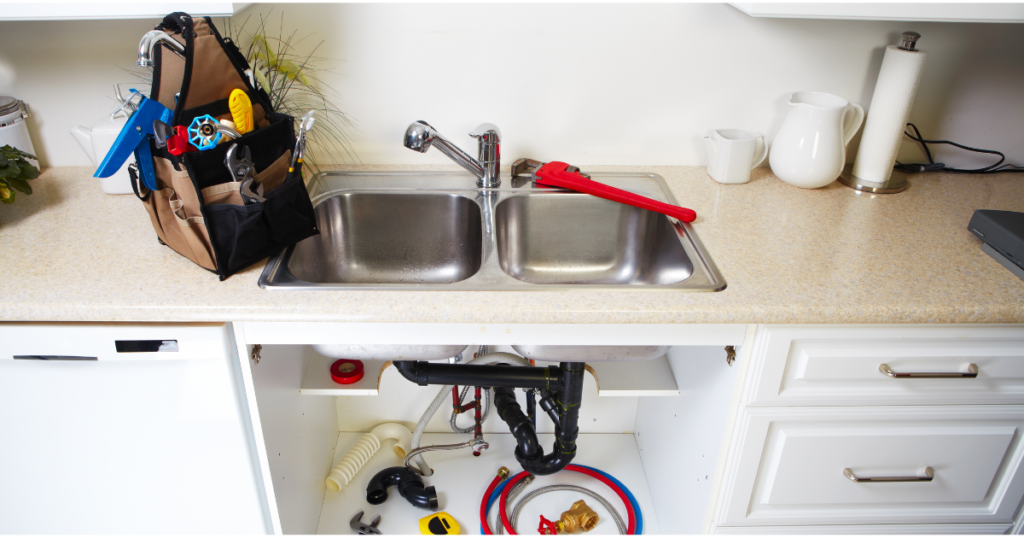
What are the risks of DIY plumbing repairs?

DIY plumbing repairs can be tempting for the hands-on homeowner looking to save money or take immediate action on household issues. However, diving into plumbing work without the proper knowledge, tools, or experience carries several risks that can lead to more harm than good.
Here are some of the most common risks associated with DIY plumbing repairs:
- Water Damage: One of the most immediate and damaging risks is causing water damage to your home. A small mistake, like not properly sealing a joint or incorrectly installing a fixture, can lead to leaks. These leaks might seem minor at first but can cause significant damage to walls, floors, and even the foundation over time.
- Safety Hazards: Plumbing work often involves dealing with complex systems that can pose safety risks if not handled correctly. For example, working on gas lines without proper precautions can lead to gas leaks, posing a severe risk of explosion. Electrical safety is another concern, especially in areas where water and electricity might intersect.
- Legal and Warranty Issues: Many areas have specific codes and regulations governing plumbing work to ensure safety and efficiency. DIY repairs might violate these codes, leading to legal issues or fines. Additionally, performing DIY work on appliances or systems still under warranty can void these warranties, costing you more in the long run.
- Increased Costs: While the intention behind DIY repairs is often to save money, mistakes made during the process can lead to increased costs. Incorrect repairs might only provide a temporary fix, requiring professional intervention later on. In some cases, DIY attempts can exacerbate the problem, making professional repairs more extensive and costly.
- Time Consumption: DIY projects often take longer than anticipated, especially for those with limited experience. Plumbing repairs can become time-consuming projects that stretch over days or weeks, leaving you without essential services like running water or a functioning bathroom during this time.
- Compromised System Efficiency: Even if a DIY repair seems successful, there’s a risk that the plumbing system’s overall efficiency and functionality have been compromised. For example, incorrect pipe sizing or installation might lead to reduced water pressure or increased energy costs.
- Health Risks: Plumbing work can sometimes expose you to health hazards, such as mold, asbestos (in older homes), or sewage. Without the proper protective gear and precautions, you risk exposure to these harmful substances, which can have long-term health consequences.
DIY plumbing should only be utilized for minor repairs and maintenance that do not require specialized knowledge or tools. This approach is suitable for tasks such as replacing washers in faucets, unclogging drains with a plunger or drain snake, fixing a running toilet, or installing a new showerhead. These types of projects typically don’t involve significant alterations to your plumbing system and pose minimal risk of causing damage if performed correctly.
Before embarking on any DIY plumbing repairs, it’s crucial to:
- Assess Your Skills and Knowledge: Be honest about your abilities and the complexity of the task. If the project goes beyond basic repairs or maintenance, it might be time to call a professional.
- Understand the Scope of the Project: Ensure you fully understand the steps involved and the potential complications that could arise. Research thoroughly or consult with a professional if you’re unsure.
- Have the Right Tools: Many plumbing tasks require specific tools. Having the right equipment on hand is essential for completing the job effectively and safely.
- Know Your Home’s Plumbing System: Familiarize yourself with the layout of your home’s plumbing, including the location of shut-off valves. This knowledge can prevent accidental damage and make the project smoother.
- Consider Safety and Legal Requirements: Be aware of any safety risks and adhere to local building codes and regulations. Some tasks may require permits or professional certification to ensure they’re performed safely and legally.
- Be Prepared for Unexpected Issues: Even straightforward projects can uncover unexpected problems. Be prepared to stop and seek professional help if the project escalates beyond your control.
- Understand the Limits of DIY: Recognize when a job is too complex or risky for a DIY approach. Projects involving the main water line, gas lines, major installations, or renovations typically require the expertise of a licensed plumber.
By adhering to these guidelines, homeowners can safely and effectively tackle certain plumbing tasks themselves, saving money and gaining a sense of accomplishment. However, when in doubt, consulting with or hiring a professional plumber is the best way to ensure the job is done right, protecting both your home and your investment.
Please check out the Canadian Government Plumbing Guidelines. You can also review the guidelines for the United States
Given these risks, it’s crucial to assess your skills and knowledge honestly before attempting any plumbing repairs. For complex or significant issues, hiring a professional plumber is often the safer and more cost-effective choice, ensuring that the job is done correctly and safely, adhering to local codes and regulations, and protecting your home from potential damage and yourself from legal and health risks.